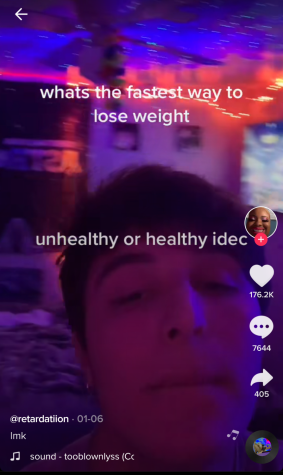Let’s stop normalizing and minimizing the impact of eating disorders
Examining social media’s detrimental portrayal of eating disorders
March 5, 2021

TW: This article discusses sensitive issues such as eating disorders and body image.
“I wasn’t going to eat anyways.”
This phrase is frequently seen as the top comment on TikTok videos featuring thin creators, implying that if someone is skinnier than them, they shouldn’t eat.
Recently, TikTok has become a watering pond for weight loss content, using trends — a phenomenon that the app is famous for — to normalize symptoms of eating disorders such as the obsession over one’s weight and calorie intake.
The platform uses an algorithm that shows users videos based on their interests (which they determine by which videos users like or which accounts users follow) on their For You Page (FYP), making the app enjoyable. This also limits the user’s control, as the FYP is the first thing that pops up when they open the app, allowing potentially triggering videos to appear without warning.
The first TikTok trend related to weight loss appeared in the beginning of shelter-in-place orders in March of 2020, as an influx of users began posting videos asking for weight loss tips, trying to achieve a “summer glow up.” This trend started off with good intentions. Since quarantine shut down gyms and confined people to their own homes, users began to promote helpful home workout routines and videos. Other TikTok users shared tips for leading healthier lifestyles, such as creating hearty smoothie recipes and offering alternatives like using whole wheat instead of white flour.
As time passed, this trend evolved. Still retaining the same name and goal of weight loss tips, users started asking for ways to lose weight “no matter how unhealthy.” Even worse, people were still providing suggestions, fueling the trend even further.

A popular suggestion was water fasting — a diet that promotes drinking water as a substitute for eating for a certain amount of days — depleting individuals of necessary nutrients. According to Health Line, water fasting is known to have a high association with bulimia nervosa, since the immediate aftereffects usually include overeating and periods of low energy, both of which are prominent symptoms of the eating disorder. Although this trend is clearly dangerous, the app’s herd mentality — the tendency for people’s behavior or beliefs to conform to others — caused users as a whole to ignore the toxicity and continue promoting it. This circulated the obsession of eating and weight loss, normalizing this unhealthy behavior.
One trend that stands out involves users posting the title, “Let’s confuse people who have a healthy relationship with food,” followed by a collage of photos that displays images ranging from calorie counters — apps that track the amount of calories eaten per meal — to weight scales and rice crackers with approximately 35 calories. The comment section was filled with remarks from others who recognized these photos and users even bonded and shared more tips. What’s worse is that no one realized how dangerous these posts are; they provided a false sense of safety, raising the deluded question, “If so many people are doing it, can it really be that bad?”
The true results of eating disorders, specifically anorexia, belie the romanticized version on TikTok that minimizes expressing their danger. The National Eating Disorder Association states that eating disorders are a mental illness and a serious issue — they take a harsh toll on one’s body, and continuous indulgence in these habits will slowly cause one’s physical and mental health to deteriorate to alarming states, resulting in consequences including organ failure.
The normalization of eating disorders did not start at TikTok — rather, they began on previous social media sites that had “hype” such as Pinterest and Musical.ly, where the hashtags “pro-ana” and “pro-mia,” which stand for pro-anorexia and pro-bulimia, respectively, were used to circulate numerous triggering videos. TikTok and its predecessors have taken precautions before, banning the hashtags and any labelled videos and providing users searching for this content with the National Eating Disorder Hotline. But users nevertheless found loopholes and were able to continue posting under misspelled hashtags, allowing similar dangerous content to remain unflagged.
Seeing others participate in the same unhealthy weight loss trends or go through the same struggles serves as encouragement and gives individuals a deluded sense of motivation to continue. Social media helps spread this mindset since it fosters the circulation of posts containing these trends, and also provides a community of unhealthy users who follow them, telling each other how effective the tips are in the comments.
This problem extends far beyond the realm of social media platforms. Eating disorders have been a major issue for a long time— society’s toxic beauty standards teach us to aspire to be skinnier from a young age.
The media has long glorified photos of underweight models, projecting their body shape as the ideal beauty standard. Seeing these images everywhere — from mainstream TV to being plastered on store windows — inevitably causes susceptible minds, especially young girls, to begin comparing themselves with the models. This mindset leads to an unhealthy fixation on weight and body image, manifesting into potentially unhealthy eating patterns.
TikTok has a “not interested” button and a feature to block users and sounds from showing up on the FYP. Merely not interacting with a harmful post can deter another one from showing up, and simply reporting it can prevent it from showing up on other users’ FYPs.
But we need to begin addressing this issue not only on TikTok but together as a community. Our biggest problem is society glamorizing its definition of an “ideal body.” We have to stop promoting this beauty standard and instead, begin encouraging the importance of maintaining a healthy body, one that will look different for everyone. This includes shifting our goals towards healthier lifestyles rather than weight loss — blogs such as Plant-Based on a Budget and A Couple Cooks or workout channel POPSUGAR Fitness help encourage this behavior.
Changing our mindset helps directly attack the roots of eating disorders but we also need to actively fight against them; commencing education towards this mental illness is necessary, as the caveat will begin to dissolve the romanticization that currently surrounds it. Actively speaking up and promoting resources that can help others such as the National Eating Disorder Hotline and specific organizations and websites that direct their focus on eating disorders can spread more awareness and be extremely helpful to our community. Acknowledging this problem is the first step; once achieved, we can slowly take it down piece by piece.




























